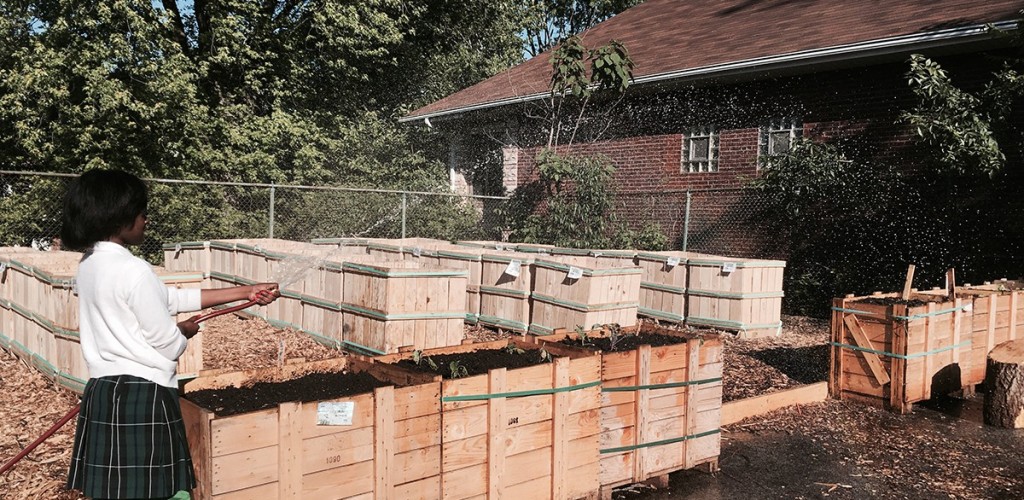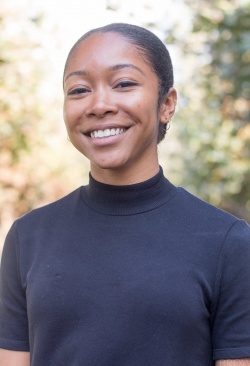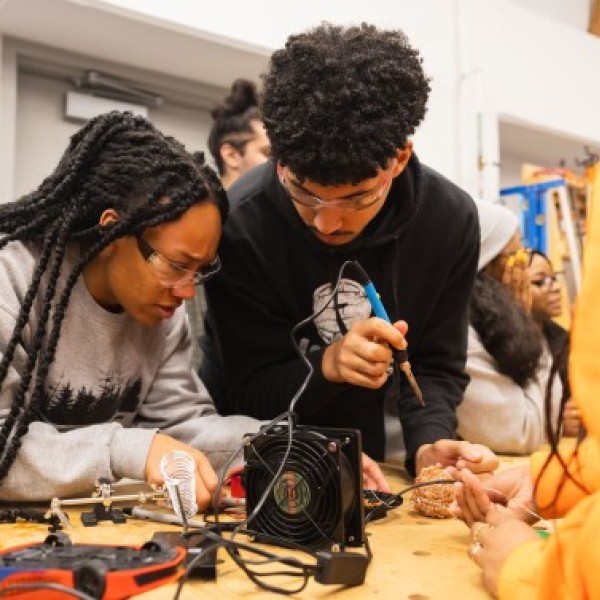The South Side of Chicago, where Dejah Powell ’18 grew up, is known as an urban food desert – a sprawling area that has few grocery stores. While the problem has persisted for decades, Powell has devised a solution that has already provided affordable fresh produce to residents in her former neighborhood.
Last summer, Powell mobilized a team of volunteers to design and plant a community garden at her former elementary school, which offered fruits and vegetables to children, teachers and neighborhood residents. The project won several national awards and was a finalist in the Citizen E competition, which provides grants to individuals creating transformative community projects.
Through her awards and grants, Powell, an environmental and sustainability science major, raised $38,000 to fund the school garden and a weeklong environmental summer camp she created for 14 inner city youth in 2016. Powell organized both projects through a nonprofit organization she founded called Get Them to the Green.
“I was interested in looking at ways to grow food on the South Side in underutilized space and find a means to distribute that food to consumers,” said Powell, who also worked with Gardeneers, a Chicago nonprofit, on the school garden. “It was kind of a business venture that I was exploring, but I had no idea of how to grow food.”
While the funding, including a $2,500 grant from Cornell, allowed her to develop the garden and the camp, Powell also attributes her success to the skills she learned through the Dyson Business Minor for Life Sciences Majors. “It’s one thing to go from vision and dreaming of what you want to actually getting it to happen,” Powell said. “You need certain tools to make those ideas happen, and a lot of the principles that you’re learning in the courses for the minor, such as marketing, really help.”
Powell learned about agriculture by enrolling in a study abroad experience during her junior year. While visiting Vietnam, Morocco and Bolivia, she interviewed farmers and agricultural professionals for a research project focused on the resilience of farming practices during climate change.
In addition to national awards, Powell was selected as a Dyson Societal Solutions Scholar, a program that offers up to $20,000 to four to five students each year to create an innovative project that will have a community impact.
“Dejah is interested in finding ways to address this important and timely problem,” said Nancy Chau, professor of applied economics and management, who directs the Societal Solutions Scholars program. “She wrote a very strong proposal, based on on-the-ground experiences.”
Powell used $5,000 of the scholarship to support her internship last summer and hopes to use the remaining funding to pay for the school garden this summer.
At Cornell, Powell received the Gary and Marilyn Hellinger Business Model Award last year for her work with Shreya Maheshwari ’19 developing a mobile app to help freshmen form study groups in introductory courses.
“Dejah showed excellent leadership in her team and put together a coherent and credible pitch deck that was a standout,” said Deborah Streeter, the Bruce F. Failing Sr. Professor of Personal Enterprise and Small Business Management. “The judges were impressed with the primary research, as it included conversations with at least 40 prospective customers and experts.”
Powell, who is writing her senior thesis on food apartheid, hopes to use the skills she learned building the app to create a technology platform that will connect people, food and farms in Chicago. After graduation she plans to work in the nonprofit sector in Chicago on issues related to the environment, climate change and food accessibility.
Powell said she is grateful to Cornell “for all the resources and opportunities it has provided me to learn how to become more of an engaged citizen. I hope to try to take everything that I’ve learned and go back to my own community and try to make an impact.”







